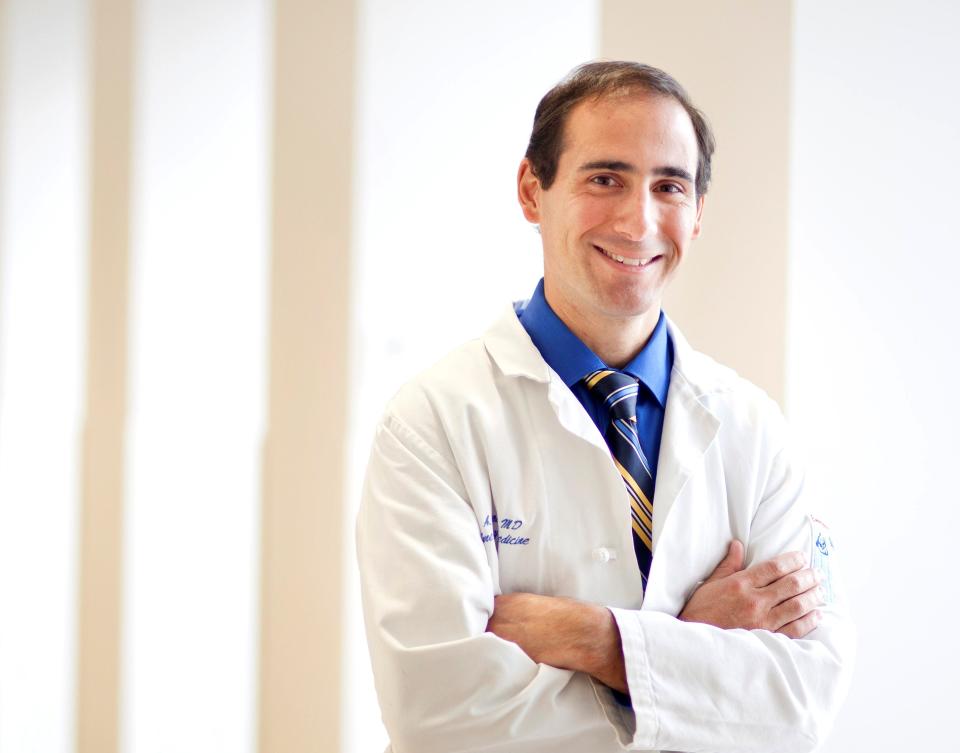What is RSV? Answers to all your questions from Newport Hospital doctors
- Oops!Something went wrong.Please try again later.
Traditional cold-weather illnesses are making a comeback this year, just as the 2022 holiday season starts hitting its stride. And they’ve added to their posse an affliction known by its three-letter acronym: RSV.
But who exactly is this seeming newcomer to the holiday party-crashing scene, and perhaps more importantly, should YOU be concerned for yourself and your loved ones … particularly your children?
Read on to allay some, if not all, of your fears.
What is RSV?
Respiratory syncytial (pronounced sin-SISH-uhl) virus – one of the common viruses that circulate in our environment. Tiny genetic mutations also help these viruses evolve into slightly different and potentially more violent versions when they resurface each year – similar to the COVID variants that gained notoriety: Delta, Omicron, et cetera. As a result, some strains end up being harsher to humans than others.

RSV infections usually emerge around December and January. However, RSV season started earlier this year, as evidenced by the number of patients who are coming into our hospitals and urgent care sites seeking treatment for the virus.
Does RSV only affect children?
No, anyone is susceptible to RSV. However, those who typically suffer extreme bouts are young children, predominantly those less than two years old and with certain risk factors, such as having been born prematurely, with heart or lung disease, or other health conditions.
While adult RSV infections are uncommon, those most vulnerable – as we also saw throughout the COVID pandemic – tend to be older adults with chronic lung or heart disease and/or weakened immune systems. Such conditions can worsen because of RSV. Both children and adults can also develop other adverse effects, including pneumonia, as we’ve witnessed previously with COVID and influenza.
What do most RSV symptoms look like?
For older children and most adults, RSV resembles a common cold:
· sniffles
· congestion
· low-grade fevers
· fatigue
· achiness
In addition, when children feel sicker, they often can’t drink or eat normally. Not being able to urinate for several hours, a lack of tears when crying, and/or a dry inside of the mouth can be additional signs of dehydration that may warrant a call to your doctor.
Coughing ends up being a particularly troubling RSV symptom for many children and people in general. They just can’t seem to catch their breath and often experience chest pain. For some, it ends up being more severe.

For example, if, while your child is breathing, he or she keeps pulling at the neck muscles or those in between the ribs to help them breathe, if the nostrils flare, if they’re grunting … in general, if breathing appears abnormally labored, this could be an indication of more severe illness warranting prompt medical attention. Furthermore, if someone appears blue in the face or around the lips, they should be seen by a medical professional as soon as possible.
What should I do if I think my child or I might have RSV?
Unlike for COVID, at-home tests for RSV aren’t readily available. Hospital emergency rooms can certainly test for it, but if you suspect a case of RSV in yourself or someone you love, we recommend that you start with your primary care doctor or your child’s pediatrician. Many, if not all of them can test for RSV. Most urgent care centers should be able to as well.
If you’re worried about more severe symptoms, please don’t hesitate to visit your nearest emergency room, whether that be at Newport Hospital or any of our sister hospitals.
Can anything be done to treat RSV or present getting it in the first place?
Again, as we saw with COVID, the most effective ways to prevent the spread and exposure to RSV are very common-sense in nature, much the same as would apply for colds and other illnesses. These include:
· regularly and thoroughly washing your hands
· cleaning high-traffic surfaces
· eating healthy and staying well hydrated
· getting proper exercise and good, adequate rest
· avoiding, when possible, those who are known to be sick or vulnerable
Treatment options may look and sound familiar, too. Over-the-counter medicines like acetaminophen and ibuprofen can work very well as fever-reducers and anti-inflammatories. Given the extensive data we’ve seen regarding cough medicines, we generally don’t recommend administering Dextromethorphan (brands like Delsym, Robafen, Tussin, and others) or Guaifenesin (Mucinex or Geri-Tussin, for example) to children under age five.
However, if your child is more than a year old, you can give them tea with honey and lemon to treat the cough. A humidifier in the bedroom can help alleviate some cough symptoms, especially while sleeping. You can also get the shower nice and steamy and sit in the bathroom with your child for about 20 to 30 minutes to help break up their congestion. A couple of drops of saline solution in the nose, along with a suctioning device, can help kids who cannot blow their own noses the same way older people can.
Of course, no one can guarantee that you or your children won’t contract RSV or any other illness. However, adhering to these proven practices and techniques should reduce the likelihood that RSV will RSVP to your family celebrations this holiday season.
Dr. Anthony Napoli serves as director of emergency medicine at Newport Hospital. Dr. Sakina Sojar is a pediatric emergency medicine attending physician at Hasbro Children’s Hospital. Health Matters appears monthly on newportri.com and in The Daily News.
This article originally appeared on Newport Daily News: What is RSV? Answers to all your questions about the latest illness

